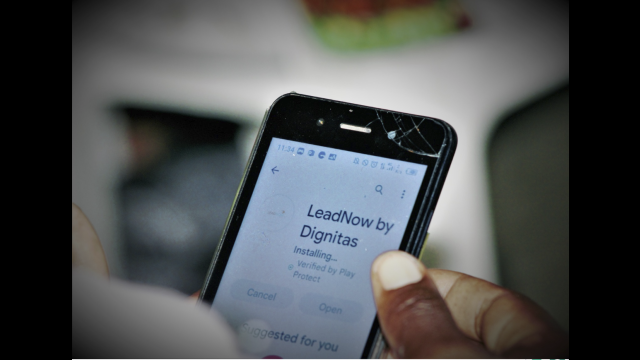Dignitas is a leading education organization whose mission is to ensure that schools are vibrant places for all children to learn. Dignitas equips teachers and instructional leaders with the necessary skills required for effective teaching and leadership. One of the ways that Dignitas equips these key stakeholders is through LeadNow, a digital learning app. Recognizing the diverse commitments of educators, LeadNow is a flexible learning tool, which allows them to access content when and where they deem fit. Educators can use the app to improve their skills in teaching literacy and numeracy and to empower other teachers with the same skills. This case study delves into the strategic use of SMS nudges to encourage educators using LeadNow to progress in their learning journeys.
SMS Nudges
The time for instructional leaders to go through one module and apply the knowledge in their lessons or school was three weeks. To encourage completion of the modules in time, as well as encourage educators to progress in their learning journeys, there were 2 types of SMS sent to the instructional leaders:
- Module Completion SMS: These were sent to the instructional leaders who had not started a module at the expected timeline or those who had started but had not completed it. The aim was to encourage them to complete the module(s). Apart from module completion, the SMS also had a positive impact on the instructional leaders’ practice due to the knowledge gained after completing the modules.
- Competency Level SMS: These were sent to the instructional leaders based on their competency level(s). These SMS enabled users to know their performance, and areas of improvement, and set goals.
The SMS nudges were data-driven as they leveraged in-app data. The in-app data showed module completion (not started, incomplete, or complete). The data also showed the competency level of the user. There are 4 competency levels namely emerging, intermediate, mastery, and advanced. This data was utilized to create individualized nudges to target individual mastery levels. This allowed for personalized SMS nudges tailored to each individual's progress and achievements. Finally, the SMS nudges encouraged the user to set 2 goals based on what they learned in the module. This built on the goals set in-app and promoted an ongoing learning journey.
There were three SMS nudges per module cycle, as outlined below:
- SMS 1 (Day 1)
This SMS aimed to reinforce the practice of a particular competency level, for example, an emerging competency level. Instructional leaders who completed a module received an SMS nudge.
SMS 1 Examples:
- Emerging: Dear *Name*, Congratulations on becoming an Emerging School Leader. Keep it up by describing formative assessment and identifying 2 ways you can use assessment to improve teaching and learning.
- Advanced: Dear *Name*, Congratulations on becoming an Advanced School Leader. Keep it up by CONSISTENTLY helping teachers in your school to use formative assessment to improve teaching and learning or foundational literacy and numeracy
2. SMS 2 (Day 7):
This SMS aimed to nudge instructional leaders to take their competency to the next level e.g. from emerging to intermediate competency level.
SMS 2 Examples:
- Emerging: Dear *Name*, If you’d like to take your competency to the next level, you can try outlining some formative assessment strategies you can use to improve teaching and learning or how you can identify learners’ strengths and gaps to improve teaching and learning.
- Advanced: Dear *Name*, If you’d like to take your competency to the next level, you can try writing down and CONSISTENTLY implementing strategies that will help teachers in your school to use formative assessment to improve teaching and learning or foundational literacy and numeracy.
3. SMS 3 (Day 14)
This SMS aimed to nudge instructional leaders to note down two goals to help improve their practice, as they get ready to move to the next LeadNow module.
SMS 3 Examples:
- Emerging: Dear *Name*, As you get ready for the next LeadNow module, note down two goals to help improve your practice. You could consider formative assessment strategies to improve teaching and learning or formative assessment strategies to improve foundational literacy and numeracy.
- Advanced: Dear *Name*, As you get ready for the next LeadNow module, note down two goals to help improve your practice. You could consider things you will CONSISTENTLY do to help teachers use formative assessment to improve teaching and learning or literacy and numeracy in your school.
Outcomes of SMS nudges
The impact of the SMS nudge was evident as the completion rates for both modules improved significantly. The personalized approach, positive reinforcement, and persistent encouragement proved to be catalysts in transforming intentions into actions. The SMS nudges influenced behaviour change since the SMS asked an instruction leader to take a specific action e.g. read on LeadNow or set a goal. This led to a significant increase in module completion, thereby, increasing the impact of LeadNow.
It’s important to note that there were WhatsApp groups that were used for communication, technical support (assisting instructional leaders who had challenges accessing LeadNow or completing modules), and nudging school leaders to complete modules.
Key learnings
There are four key learnings that this SMS nudge intervention provides us with.
- Understanding behaviour can drive engagement: Understanding the nuances of human behavior is instrumental in designing interventions that resonate with the target audience.
- Persistence yields results: Achieving behaviour change is an ongoing journey, not a one-time activity. Therefore, by consistently sending SMS nudges, the instructional leaders were reminded to act. The iterative nature of the SMS nudges highlights the importance of persistence in achieving sustained impact.
- Positive reinforcement motivates: Acknowledging and celebrating achievements through positive reinforcement enhances motivation and sustains engagement.
- Personalization matters: Tailoring nudges to individuals based on their progress and achievements promotes a sense of connection and relevance.
Related Case Study in Scale Toolkit

